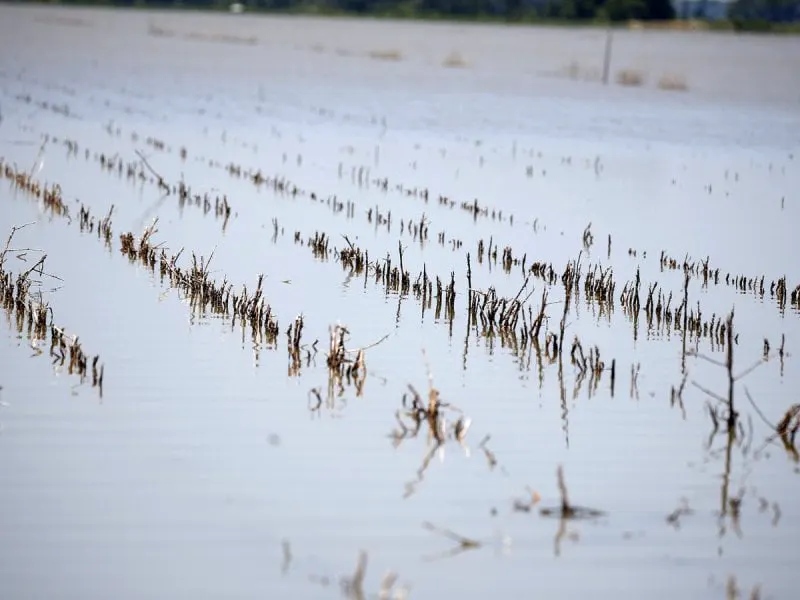Global crop yields projected to drop as temperatures rise, new study finds
Global crop yields projected to drop as temperatures rise, new study finds


The study, published [June 29] in Nature Sustainability, estimated that yields of soy, maize, rice and wheat are all likely to decrease as the planet warms. Projected — but uncertain — benefits from elevated CO2 levels may mitigate the losses somewhat. The four crops comprise more than 60 percent of the calories produced globally.
Researchers combined a global dataset of field warming experiments conducted at 48 sites to estimate decreased yields of 7.1 percent for maize, 5.6 percent for rice, 10.6 percent for soybean and 2.9 percent for wheat. Their estimates were 95 percent probable for the first three staples and 89 percent for wheat.
In response, “technological and adaptive measures, such as northern expansion of the croplands, will thus have to increase yield by 1.8–2.0 percent per year to meet the conservative estimates of a 70 percent increase in food demand,” the researchers wrote.
However, that required rate is higher than the historical yield increases in the late 20th century, “which is both challenging and alarming, considering the stagnating yield increases widely observed for the past decade,” they concluded.
Though warming temperatures are already causing yields to drop, these losses have “been masked by technology-driven increases in yields,” the researchers wrote. “To achieve zero hunger by 2030 and beyond, as one of the United Nations Sustainable Development Goals, the world is now facing a big challenge due to the expected increase in impacts of climate change: can food security be ensured for the ever-growing global population under climate change?”
To answer that question, it’s important to understand how crop yields are affected by changing temperatures, said the researchers, who found that most crop-modelling studies were site-based and thus failed to provide an accurate global picture.
Though their analysis found that wheat “is probably less sensitive to global warming than currently projected,” it estimated greater yield losses for the other three crops. This is important because rice and maize are staple foods in many developing countries in Africa, Latin America and Asia, increasing their potential vulnerability to climate change. “Soybean appears the most vulnerable to climate warming,” they found.
The estimates are complicated by numerous factors, such as uneven crop production across countries, whether crops are rain-fed or irrigated and the fact that “warming is not globally uniform.” However, warmer temperatures are more likely to negatively impact wheat production in India than other irrigated wheat-producing areas, they found.
Despite the uncertainties, however, “the overall emerging picture is quite clear,” researchers wrote. “Yield losses in response to a global mean warming level of 1.5 Celsius, as aimed for in the Paris Agreement, would still be substantial, ranging from 2 percent to 7 percent across the main producing countries.”
The study considered only the impact of rising temperatures on yields. Increased pressure from plant pests and diseases associated with climate change are also predicted to depress yields.
Joan Conrow has more than 35 years of experience as a journalist and editor. She specializes in environmental issues, biotechnology, and agriculture, and is especially interested in how these highly charged topics are playing out globally. Joan holds a BA in history and journalism and is certified in beekeeping, mediation, and facilitation. Find Joan on Twitter @joanconrow
A version of this article was originally posted at the Cornell Alliance for Science website and has been reposted here with permission. The Cornell Alliance for Science can be found on Twitter @ScienceAlly

 | Videos | More... |

Video: Nuclear energy will destroy us? Global warming is an existential threat? Chemicals are massacring bees? Donate to the Green Industrial Complex!
 | Bees & Pollinators | More... |

GLP podcast: Science journalism is a mess. Here’s how to fix it

Mosquito massacre: Can we safely tackle malaria with a CRISPR gene drive?

Are we facing an ‘Insect Apocalypse’ caused by ‘intensive, industrial’ farming and agricultural chemicals? The media say yes; Science says ‘no’
 | Infographics | More... |

Infographic: Global regulatory and health research agencies on whether glyphosate causes cancer
 | GMO FAQs | More... |

Why is there controversy over GMO foods but not GMO drugs?

How are GMOs labeled around the world?

How does genetic engineering differ from conventional breeding?
 | GLP Profiles | More... |

Alex Jones: Right-wing conspiracy theorist stokes fear of GMOs, pesticides to sell ‘health supplements’




 Trust issues: What happens when therapists use ChatGPT?
Trust issues: What happens when therapists use ChatGPT? California, Washington, Oregon forge immunization alliance to safeguard vaccine access against federal undermining
California, Washington, Oregon forge immunization alliance to safeguard vaccine access against federal undermining Fighting deforestation with CO2: Biotechnology breakthrough creates sustainable palm oil alternative for cosmetics
Fighting deforestation with CO2: Biotechnology breakthrough creates sustainable palm oil alternative for cosmetics Viewpoint — Fact checking MAHA mythmakers: How wellness influencers and RFK, Jr. undermine American science and health
Viewpoint — Fact checking MAHA mythmakers: How wellness influencers and RFK, Jr. undermine American science and health 30-year-old tomato line shows genetic resistance to devastating virus
30-year-old tomato line shows genetic resistance to devastating virus The free-range chicken dilemma: Better for birds, but with substantial costs
The free-range chicken dilemma: Better for birds, but with substantial costs Viewpoint: Video — Big Solar is gobbling up productive agricultural land and hurting farmers yet providing little energy or sustainabilty gains
Viewpoint: Video — Big Solar is gobbling up productive agricultural land and hurting farmers yet providing little energy or sustainabilty gains ‘You have to treat the brain first’:Rethinking chronic pain with Sanjay Gupta
‘You have to treat the brain first’:Rethinking chronic pain with Sanjay Gupta
